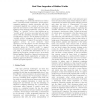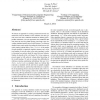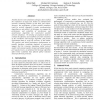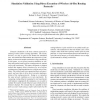124
Voted
DSRT
2003
IEEE
15 years 8 months ago
2003
IEEE
This paper describes a solution to extend the Managed Bandwidth Service (MBS), which is provided on a backbone network using MPLS VPNs, to non-MPLS domains and also evaluates it. ...
156
click to vote
DSRT
2003
IEEE
15 years 8 months ago
2003
IEEE
“Smart Things” are commonly understood as wireless ad-hoc networked, mobile, autonomous, special purpose computing appliances, usually interacting with their environment impli...
120
Voted
PADS
2004
ACM
15 years 8 months ago
2004
ACM
We discuss an approach for creating a federated network simulation that eases the burdens on the simulator user that typically arise from more traditional methods for defining sp...
108
Voted
PADS
2004
ACM
15 years 8 months ago
2004
ACM
An efficient cancellation scheme is essential to the performance of Time Warp simulations. The pitfalls of rollback echoes, chasing hazards and cascading rollbacks can be identi�...
140
Voted
PADS
2004
ACM
15 years 8 months ago
2004
ACM
In mobile ad hoc network (MANET) studies, it is imperative to use highly detailed device models as they provide high layer protocols with good prediction of underlying wireless co...
109
Voted
PADS
2004
ACM
15 years 8 months ago
2004
ACM
Parallel discrete event simulation techniques have enabled the realization of large-scale models of communication networks containing millions of end hosts and routers. However, t...
120
Voted
PADS
2004
ACM
15 years 8 months ago
2004
ACM
This paper advocates the use of a formal framework for analyzing simulation performance. Simulation performance is characterized based on the three simulation development process ...
116
Voted
PADS
2004
ACM
15 years 8 months ago
2004
ACM
Computer simulation is the most common approach to studying wireless ad-hoc routing algorithms. The results, however, are only as good as the models the simulation uses. One shoul...
108
Voted
PADS
2004
ACM
15 years 8 months ago
2004
ACM
In optimistic simulations, checkpointing techniques are often used to reduce the overhead caused by state saving. In this paper, we propose event reconstruction as a technique wit...
142
Voted
PADS
2004
ACM
15 years 8 months ago
2004
ACM
We investigated the benefit of exploiting the symmetries of graphs for partitioning. We represent the model to be simulated by a weighted graph. Graph symmetries are studied in th...





